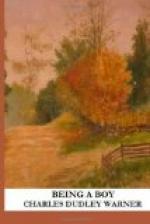At noon was Sunday-school, and after that, before the afternoon service, in summer, the boys had a little time to eat their luncheon together at the watering-trough, where some of the elders were likely to be gathered, talking very solemnly about cattle; or they went over to a neighboring barn to see the calves; or they slipped off down the roadside to a place where they could dig sassafras or the root of the sweet-flag, roots very fragrant in the mind of many a boy with religious associations to this day. There was often an odor of sassafras in the afternoon service. It used to stand in my mind as a substitute for the Old Testament incense of the Jews. Something in the same way the big bass-viol in the choir took the place of “David’s harp of solemn sound.”
The going home from meeting was more cheerful and lively than the coming to it. There was all the bustle of getting the horses out of the sheds and bringing them round to the meeting-house steps. At noon the boys sometimes sat in the wagons and swung the whips without cracking them: now it was permitted to give them a little snap in order to bring the horses up in good style; and the boy was rather proud of the horse if it pranced a little while the timid “women-folks” were trying to get in. The boy had an eye for whatever life and stir there was in a New England Sunday. He liked to drive home fast. The old house and the farm looked pleasant to him. There was an extra dinner when they reached home, and a cheerful consciousness of duty performed made it a pleasant dinner. Long before sundown the Sunday-school book had been read, and the boy sat waiting in the house with great impatience the signal that the “day of rest” was over. A boy may not be very wicked, and yet not see the need of “rest.” Neither his idea of rest nor work is that of older farmers.
VI
THE GRINDSTONE OF LIFE
If there is one thing more than another that hardens the lot of the farmer-boy, it is the grindstone. Turning grindstones to grind scythes is one of those heroic but unobtrusive occupations for which one gets no credit. It is a hopeless kind of task, and, however faithfully the crank is turned, it is one that brings little reputation. There is a great deal of poetry about haying—I mean for those not engaged in it. One likes to hear the whetting of the scythes on a fresh morning and the response of the noisy bobolink, who always sits upon the fence and superintends the cutting of the dew-laden grass. There is a sort of music in the “swish” and a rhythm in the swing of the scythes in concert. The boy has not much time to attend to it, for it is lively business “spreading” after half a dozen men who have only to walk along and lay the grass low, while the boy has the whole hay-field on his hands. He has little time for the poetry of haying, as he struggles along, filling the air with the wet mass which he shakes over his head, and picking his way with short legs and bare feet amid the short and freshly cut stubble.




